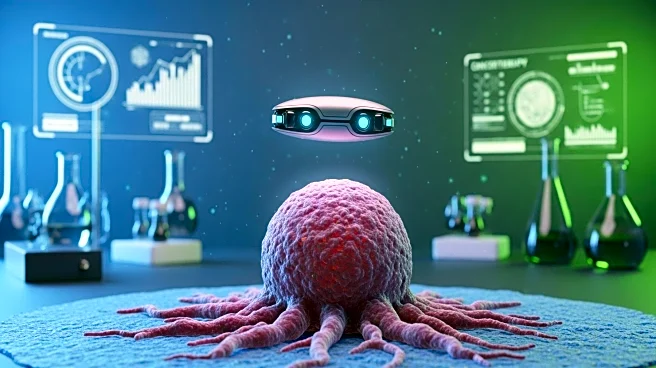What's Happening?
Researchers at the Fralin Biomedical Research Institute at Virginia Tech Carilion, in collaboration with global partners, are pioneering the use of nanotechnology in cancer immunotherapy. Recent publications in leading journals highlight their work in integrating nanomedicine with immune engineering to enhance the effectiveness of cancer treatments. This approach aims to overcome the defenses that tumors use to evade the immune system, particularly in solid tumors that resist conventional therapies. By utilizing nanotechnology, scientists can engineer therapeutic agents to penetrate tumors, modulate immune responses, and work synergistically with existing treatments. The research focuses on improving drug delivery systems, reprogramming the tumor microenvironment, and enhancing immune cell activity to target cancer cells more effectively.
Why It's Important?
The integration of nanotechnology in cancer immunotherapy represents a significant advancement in oncology, offering potential for more precise and effective treatments. This approach could revolutionize how stubborn cancers are treated, particularly those that have been resistant to traditional therapies. By improving the delivery and efficacy of therapeutic agents, this research could lead to treatments with fewer side effects and better outcomes for patients. The work being done at the Fralin Biomedical Research Institute could pave the way for new, personalized cancer therapies that are more accessible and effective, potentially transforming cancer care and improving survival rates.
What's Next?
The next steps involve translating these scientific discoveries into clinical applications. This includes navigating regulatory challenges, ensuring manufacturing scalability, and demonstrating the safety and efficacy of these therapies in diverse patient populations. Continued funding and collaboration with institutions like the National Institutes of Health and the American Cancer Society will be crucial in advancing this research. As the field progresses, further exploration of nanoparticle design and immune modulation strategies is expected to yield innovative therapeutic platforms, contributing to a new era of precision oncology.
Beyond the Headlines
The fusion of nanotechnology and immunology could redefine cancer treatment landscapes, offering hope for durable remissions and broader applicability across cancer types. This paradigm shift emphasizes the immune system's role as a frontline defense against malignancy, potentially leading to more effective and lasting treatments. The ongoing research highlights the importance of interdisciplinary collaboration in uncovering optimal combinations of nanoformulations and immunotherapies, ultimately aiming to eradicate malignancies.









